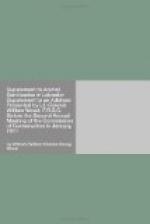be part of the National capital of our children
and children’s children, this destruction
of so much that is beautiful and grand, goes
hand in hand with the sordid selfishness which is
responsible for so very much of the misery of our
civilization. The movement for the conservation
of our natural resources, for the protection
of our forests and of the wild life of the woods,
the mountains and the coasts, is essentially
a democratic movement. Democracy, in its essence,
means that a few people shall not be allowed for their
own selfish gratification, to destroy what ought to
belong to the people as a whole. The men
who destroy our forests for their own immediate
pecuniary benefit, the men who make a lifeless
desert of what were once coasts teeming with
a wonderfully varied bird life, these, whether rich
or poor, and their fellows in destruction of
every type, are robbing the whole people, are
robbing the citizens of the future of their natural
rights. Over most of the United States,
over all of South Africa and large portions of Canada,
this destruction was permitted to go on to the bitter
end. It is late now, but it is not too late for
us to put a stop to the process elsewhere.
What is being done in Labrador is substantially
what was done, and is still, in places, being
done in Florida. A resolute effort is now being
made by the Audubon Societies, and all kindred organizations,
to stop the waste in the United States. Great
good can be done by this effort, for there is
still very much left to save in the United States.
But there is very much more left to save in Canada.
Canada has taken the lead in many matters of
far-reaching importance to the future welfare
of mankind, and has taught other nations much.
She can teach no more important lesson to other
nations, and incidentally, she can benefit herself
in no more striking way, than by resolutely setting
to work to preserve her forests, and the strange
and beautiful wild creatures, both beasts and
birds, of her forests and her sea-coasts. Labrador
offers one of the best of all possible fields for
such work. The forests, the wild beasts and
wild birds of Labrador can be kept perpetually
as one of the great assets of Canada; or they
can he destroyed in a spirit of brutal and careless
vandalism, with no permanent benefit to anyone, and
with the effect of ruining the country and preventing
its ever becoming what it otherwise would become.
The economic argument is by no means the only
argument, and, in my eyes, is hardly the most
important argument for preserving the forests
and wild life of Labrador, as your Commission
desires to preserve them, but it is in itself so important
that, even though there were no other reason to be
adduced, it would amply warrant the taking of
the action you recommend. I extend you my
warmest good wishes for the success of your movement.
Mr. Ernest Thompson Seton writes:




